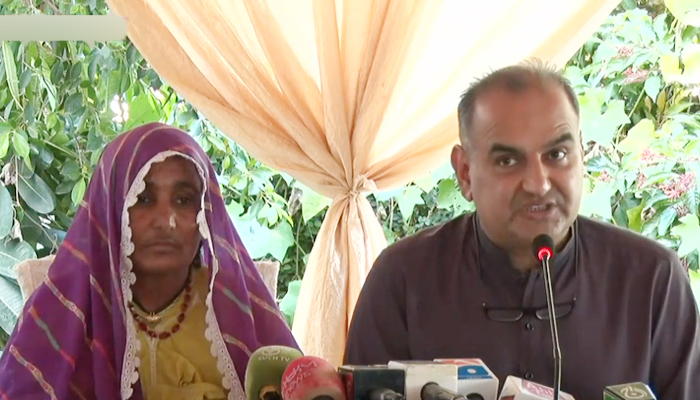India's citizenship act exposed after killing of Pakistani Hindus, says Ramesh Kumar
"This act raises the question whether it was a real act to grant amnesty or one to fool people," says Kumar
The killing of 11 Pakistani Hindus in India's Jodhpur has exposed New Delhi's Citizenship Amendment Act patron-in-chief of the Pakistan Hindu Council Dr Ramesh Kumar said Sunday.
The citizenship act offers nationality to the region's minorities, excluding Muslims.
"This [killing] raises the question whether it was a real act to grant amnesty or one to fool people," he said, addressing a press conference in Islamabad.
Eleven Pakistani Hindus, including children, were found dead in mysterious circumstances in village Lodta, Haridasot, district Jodhpur, in the Indian state of Rajasthan, on August 9, 2019, after having been living there for eight years.
A large number of Hindus from across the country have staged a sit-in at the Indian High Commission in Islamabad to protest the incident. Members of the Hindu community, led by Kumar, reached the federal capital from Sindh, Khyber Pakhtunkhwa, and other parts of the country in a caravan to protested against the killings.
They have also called upon the international community to provide them justice.
Kumar said that he would soon move the International Court of Justice against India's crime of killing the Hindu family.
Speaking of India's injustice to Muslims, he said that he was invited to attend the groundbreaking of the Ayodhya Mandir.
"I declined the offer and said that I too worship Ram but I have never heard about a place of Allah's worship being razed to the ground and a place for Ram's worship being built on top."
He said that on the one hand the Supreme Court of Pakistan is "fighting for the rights of minorities in the country" and on the other hand, the supreme court in India has issued a judgment to build a temple on top of a mosque site.
"I think such actions should not be taken," he said.
Moving on to India's treatment of Kashmiris, Kumar said the people of India-occupied Jammu and Kashmir were incarcerated in their houses for over 400 days. "This is against basic human rights," he deplored.
He said Articles 35 and 370, that India had claimed were for empowering occupied Kashmir, are having a contrary effect, and the people of the region are suffering.
Kumar said that Pakistan had only put in 5% of the effort when compared to the struggle by Kashmiris. "If we had given our 100-150% then Kashmir would have become an independent state."
"It has been 74 years and several events have taken place. Both sides have made mistakes. We are ready to sit down and work to remove all reservations but for that you must follow international laws," he said, addressing the Indian leadership.
"We will have to stop this blame game and walk on the path of truth [...] only then we will see a region like that was envisioned by Quaid-e-Azam, Mahatma Gandhi and Jawaharlal Nehru."
-
Security forces gun down 30 terrorists in multiple IBOs in KP: ISPR
-
MQM-P calls for new province in Sindh
-
US report validates Pakistan military edge over India: PM
-
Banned TTP poses serious threat to Pakistan security: UNSC panel
-
CM Afridi clarifies remarks on by-poll after ECP requests army deployment
-
Dubai sees 3.2m Pakistani passengers in 2025 as airport sets new milestone
-
Security forces kill 23 Indian proxy terrorists in KP's Kurram
-
Pakistan to construct island to boost oil exploration: report












